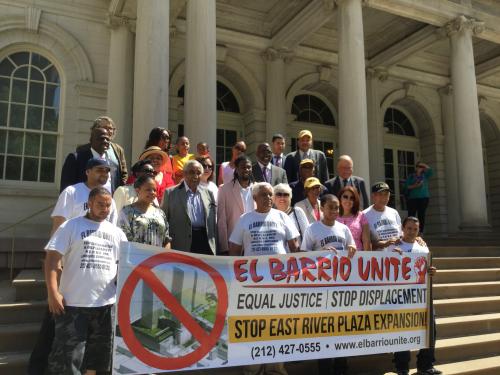New York, NY – May 29, 2015 – (RealEstateRama) — Congressman Charles B. Rangel, who represents the 13th Congressional District of New York that includes upper Manhattan and parts of the Bronx, held a rally with on the steps of City Hall in New York City, to demand a moratorium on luxury housing. Rangel in addition called for the extension of The Rent Stabilization Law (EPTA) which is set to expire June 15th, 2015. Joining the Congressman to demand affordable housing were Manhattan Borough President Gale A. Brewer, Community Service Society CEO David Jones, Councilman, Jumaane D. Williams, (Deputy Leader and Chair of Housing and Buildings Committee), Councilwoman Inez Dickens, President Hazel Dukes of NAACP New York State Conference, Henrietta Lyle of Community Board 10, Donald Notice of West Harlem Group, Bob Anazagasti of El Barrio Unite, and Rev. Georgiette Morgan-Thomas of Manhattan Community Board 9.
“Building more luxury housing is morally wrong and nonsensical at a time when the stock of affordable housing has plummeted and incomes have stagnated or declined for many New Yorkers. New York City’s economy must be bolstered by better paying jobs and investment in our infrastructure, our children’s education, and adequate housing for our struggling families,” Congressman Rangel said.
The Rent Stabilization law (EPTA), which is crucial to the affordability of housing in New York, will expire June 15th, 2015, unless action is taken by the State Legislature. This is the law that provides rights and protections for 2.5 million tenants living in rent stabilized apartments city-wide. Simply renewing the Rent Stabilization law as it is will not be enough because of how it has been amended over the years. Substantive change is needed to protect tenants and save affordable housing in New York City.
The 421-a Real Property Tax Exemption Program is also set to expire. This tax program was created in 1971 to help spur real estate development in New York City – a need that no longer exists. Yet it continues to provide tax breaks to developers constructing new buildings in the city and costs hundreds of millions in tax dollars. In 2014 alone, the program cost New York City $1.1 billion in tax revenue.
“The 421-a tax abatement program as it exists today is wasteful, broken, and doesn’t generate enough or the right kind of affordable housing. City taxpayers need Albany to make the hard call on 421-a: mend it, or end it,” said Manhattan Borough President Gale A. Brewer. “A 421-a program worth keeping will end ‘double-dipping’, require ‘affordable’ apartments actually be affordable to residents of the communities where they’re built, and require that new affordable units be made permanently affordable. Taxpayers can’t afford the status quo.”
“With a housing vacancy rate of 3.45% and steady income stagnation, it’s clear our city is in a dire housing crisis that Albany must address before our rent regulations expire next month. I am proud to stand with Congressman Rangel and elected officials to call for a moratorium on luxury housing and to send a clear message for Albany to strengthen our rent regulations, because simply renewing them would be a loss for all tenants. Albany must also confront the abysmal 421a tax abatement issue, which has produced a dismal amount of affordable housing in recent years. As Chair of the Council’s Housing and Buildings Committee, my goal is to help address our city’s chronic housing shortage to ensure that New York becomes a place for all to thrive. The Council, Mayor and advocates have put forth great suggestions to address this, but now it’s up to Albany to act. If they don’t, Governor Cuomo will be to blame,” said Council Member Jumaane D. Williams (D-Brooklyn), Deputy Leader.
According to “The Growing Gap: New York City’s Housing Affordability Challenge,” a 2014 report issued by New York City Comptroller Scott M. Stringer, housing in New York City became less affordable since 2000 as the median apartment rent rose by 75 percent while real incomes declined. This 75 percent increase is 31 percentage points higher than the rest of the U.S. Housing affordability decreased for renters in every income group during this period, with the harshest consequences for poor and working New Yorkers earning less than $40,000 a year.
“We demand from the City, State and Federal Government to include the Federal Reserve Banks to stop supporting gentrification and displacement using 421A and start preserving our East Harlem/ El Barrio Neighborhoods,” said Roberto Anazagasti, founder of El Barrio Unite. “Additionally we request a moratorium to stop the Luxury Housing immediately!”
“Harlem is strong and vibrant again. The City’s in-rem stock is almost exhausted. Therefore, we must preserve all publicly subsidized units as well as create sustainable construction jobs for local residents. The somber economic conditions faced by the residents of Harlem stand in stark contrast to the steady increase of real estate sales prices. It is vital that we are united in our effort to preserve quality, safe, affordable housing for low and moderate-income families and that it remain a priority in the City of New York,” said Donald C. Notice, Executive Director of West Harlem Group Assistance, Inc.
Added Congressman Rangel: “Everyone should have access to quality affordable housing “It saddens me when I hear renters having to spending one third of their income on just rent alone. Throughout our community, renters are faced with higher rents, fewer services, and neglected units. With critical laws dealing with housing about to expire it’s now more important than ever to deal with this problem head on and stop focusing resources on building luxury apartments for the wealthy.”



